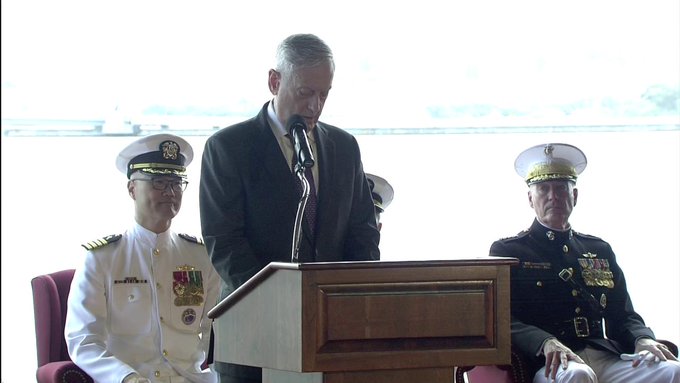By: Tara Copp
/arc-anglerfish-arc2-prod-mco.s3.amazonaws.com/public/GRBTQQOGCBG7XMF4Q4FLP2JTAA.jpg) Defense Secretary Jim Mattis announced Wednesday that U.S. Pacific Command would now be called U.S. Indo-Pacific Command, in the latest move to counter Chinese economic and military pressure in the region. Mattis said he directed the name change in recognition that “all nations large and small are essential to the region, in order to sustain stability in ocean areas critical to global peace.” The withdrawn invite follows a directive by the Pentagon to remove Chinese cellphones, other devices from exchanges over espionage fears.
Defense Secretary Jim Mattis announced Wednesday that U.S. Pacific Command would now be called U.S. Indo-Pacific Command, in the latest move to counter Chinese economic and military pressure in the region. Mattis said he directed the name change in recognition that “all nations large and small are essential to the region, in order to sustain stability in ocean areas critical to global peace.” The withdrawn invite follows a directive by the Pentagon to remove Chinese cellphones, other devices from exchanges over espionage fears.
Mattis made the remarks at the change of command ceremony in Pearl Harbor for incoming INDOPACOM commander Adm. Phil Davidson.
“In recognition of the increasing connectivity of the Indian and Pacific Oceans, today we rename the U.S. Pacific Command to U.S.-Indo Pacific Command,” Mattis said.
Secretary James N. Mattis, Secretary for @DeptOfDefense, announces the renaming of U.S. Pacific Command to U.S. Indo-Pacific Command to recognize the increasing connectivity between the Indian & Pacific Oceans and America's commitment to the #IndoPacific!
While Mattis stressed that the change was not meant to be combative, it did signal America’s commitment to ensure that every country “no matter its size …. [is] not bound by any nation’s predatory economics or threat of coercion.”
A routine freedom of navigation operation is the latest in a series of events escalating tensions between the countries.
However, outgoing commander of the former U.S. Pacific Command, Navy Adm. Harry Harris, was more direct in his assessment of China’s impact on the region.
“Great power competition is back,” Harris said. “I believe we are reaching an inflection point in history…. A geo-political competition between free and oppressive visions is taking place in the Indo-Pacific.”

No comments:
Post a Comment